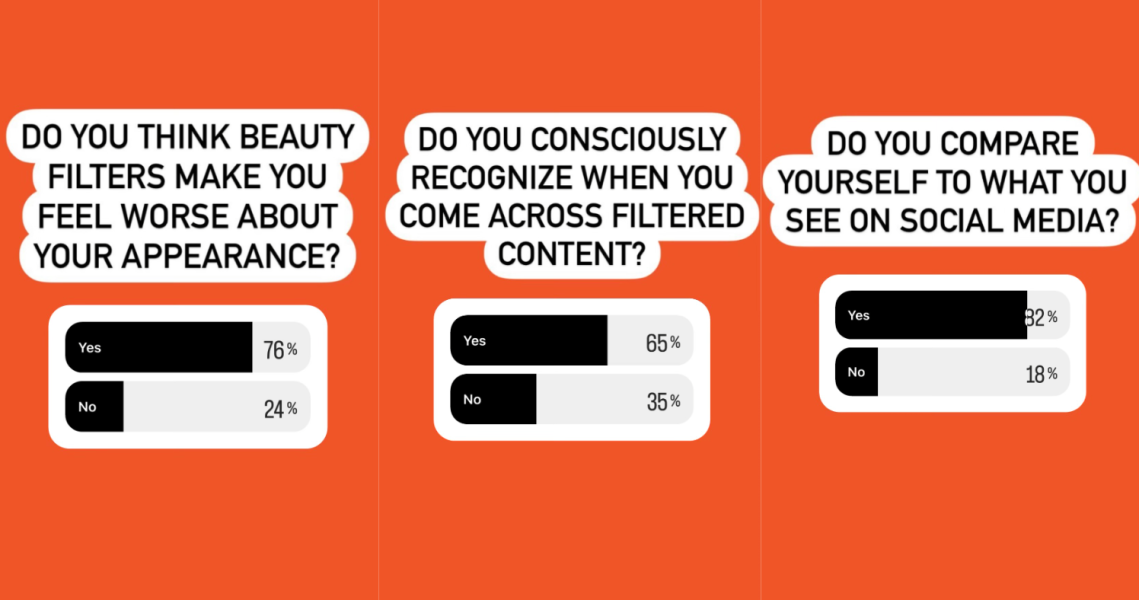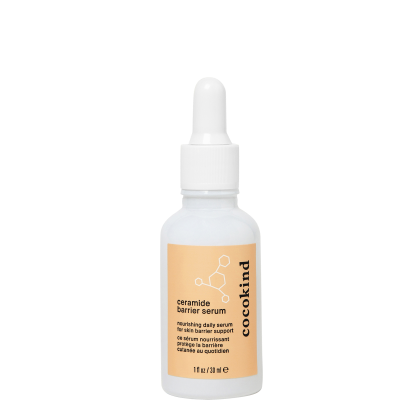In March, like the rest of us, Priscilla Tsai, founder of the 8-year-old skin-care brand Cocokind, discovered the Bold Glamour filter. In response, she took to her brand’s Instagram, posting a Reel to its 318,000 followers. In the post, Tsai has the filter on for one half of the video and off for the other half.
“Seeing images like this and seeing people with these filters [on] have real consequences, especially for the younger generation on social media,” she says in the post. “I just want to remind you that you can proactively choose what content you take in and what images you’re processing. And we don’t have to let these beauty standards take over how we feel about ourselves on a regular basis.”
That initial post was met with much positive affirmation from the brand’s followers, Tsai said. “It was a message that was clearly resonating with our community,” she said. For Cocokind’s part, it “has never used face-altering beauty filters and never retouches skin,” said Lynn Kostelny, head of brand at Cocokind.
Commenters applauded the message and echoed Tsai’s concern about the damaging impacts of filters on our mental health. For example, one wrote, “There are truly real consequences to social media filters on the younger generation which can go unnoticed or even look like innocent fun! My nieces rarely take photos without filters. 😐 These conversations are so important and needed! 🫶”
Now, two months later, the brand is taking action. On Monday, it launched its #BoldEnough pledge, in partnership with the nonprofit Half The Story, in direct response to the popular, dramatic filter. The date, May 1, was also significant as it marked the start of Mental Health Awareness Month. To kick off the campaign, Cocokind sent more than 100 creators a mailer that included its bestselling Ceramide Barrier Serum and a postcard explaining the campaign.
Cocokind is not the first beauty brand to respond to the Bold Glamour filter. Dove launched a reactive campaign encouraging people to #TurnYourBack on Bold Glamour. As reported in a March edition of the Pop newsletter, Tula posted its reaction to the filter on its TikTok. Urban Skin Rx commented on Cocokind’s Instagram post announcing the campaign, writing “We stand with #BoldEnough.”
There is a philanthropic element to the campaign, too: The brand will donate 100% of the proceeds from the Ceramide serum in May, up to $20,000, to Half The Story.
Between March and May, Tsai and her team dug into statistics about the impacts of social media on mental health, particularly among teenagers, to create the pledge. During the process, Tsai said, she realized how oblivious people have become to filters’ ubiquity. “When I was scrolling consciously, I was like, ‘Oh, my God. Literally, out of every 10 stories I watch, eight of them have filters on them.”
Half The Story is a nonprofit organization founded by Larissa May that describes itself as being “on a mission to empower the next generation’s relationship with tech.” In 2017, it became a recipient of Cocokind’s Vanderbilt grant, which is part of its impact foundation. Sophia Li, Cocokind’s sustainability adviser, also partnered on the initiative.
Tsai, May and Li each stressed that filters are more impactful than they may seem. “Every single person using the filter every single time … is influencing the entire ecosystem,” Tsai said. Including statistics was key to making Cocokind’s audience aware of the gravity of the issue, she said. The brand shared a few stats in an Instagram Story on Monday including the fact that, according to a 2021 survey by ParentsTogether, “61% of teens said beauty filters make them feel worse about their appearance,” and “Teens who use beauty filters weekly are two times more interested in cosmetic surgery than those who don’t.”
Filters are the “window in” to a “domino effect,” May said. “[In some cases,] I’m speaking to parents whose daughters are in eating disorder facilities because it started with a filter online. That is the reality that we are living in.” The brand asked its nearly 200 ambassadors to share the campaign — all have taken the pledge, it said. By Monday, several had already posted to their Instagram grids, sharing what the campaign meant to them and why they were pledging not to use filters on social media.
Elaborating why Bold Glamour, which dramatically alters the face and covers it in makeup, is so damaging, Li said, “It’s continuing to perpetuate this cultural and colonial lens of what Western beauty standards are: big eyes and light skin. We’re continuously being fed that that’s what the pinnacle of beauty is, and that we have to buy products or have surgery. It’s very hindering for any person of color and marginalized communities.” This has led to the rise of “Snapchat dysmorphia,” which the #BoldEnough campaign also hopes to combat. “Plastic surgeons are saying that people used to come to them wanting a celebrity’s nose — they’d bring in a photo of celebrity — but now they’re bringing in pictures of themselves with these filters on,” she said, citing doctors’ comments in media.
Throughout May, Cocokind will be engaging its following with polls on the brand’s Instagram Story and other calls to action. It will then share the findings from the poll on Instagram, as well as in the brand newsletter, Tsai said. So far, it has asked its community questions such as, “Do you consciously recognize when you come across filtered content?” and “Do you compare yourself to what you see on social media?”
On Tuesday, the brand hosted a dinner for noteworthy guests including influencers, actors and other friends of the brand in New York City to bring awareness to its mission. At the event, 32 guests signed the pledge on site. Thousands of members of the brand’s community have already signed the pledge, according to Cocokind.
Cocokind’s initial goal is to get as many people as possible to sign the pledge. Longer-term, it may ask other brands to get involved by signing the pledge, May said. Brands don’t necessarily rely on filters, but instead Photoshop, which also perpetuates unrealistic beauty standards. In a “dream scenario,” she said, other beauty brands, founders and social media managers would take part.
Shop the story
Inside our coverage
The Top 5 trends from the Met Gala
Maybelline taps new Pinterest feature for mental health awareness
Hayley Williams’ Good Dye Young launches at Ulta Beauty
Reading list
How Uniqlo finally won over Gen Z
Sofia Richie Grainge’s Wedding Caused Nudestix Sales to Soar
The Met walks a fine line on Lagerfeld: Judge the clothes, not the man





